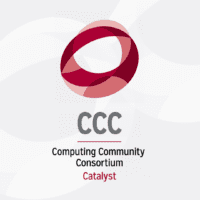Four Ways Computing Can Positively Affect Society
By Petruce Jean-Charles, Communications Associate, CCC
Computing stands as the cornerstone of modern technological progress, holding immense promise to reshape society for the better. At its essence, it provides a robust framework for problem-solving, automation, and groundbreaking innovation, capable of tackling humanity’s most urgent issues. Whether it’s bolstering healthcare with predictive analytics and tailored treatment strategies or combatting environmental threats through data-driven sustainability initiatives, computing uses transformative power across a spectrum of societal challenges.
CCC Council Chair Daniel Lopresti said computing research is important because there are risks that need to be considered. He points to innovations such as surveillance technologies which can be used to violate privacy.
In order to alleviate these risks, researchers need support in their work. CCC has conducted many research visioning activities including recent ones such as The Future of Social Technologies and Community Driven Approaches to Research in Technology & Society workshops.
Now let’s get into the four ways computing has a positive impact on society.
Improving healthcare
One key area where computing has made significant strides is in medical diagnosis and imaging. Advanced algorithms can analyze medical images such as MRIs, CT scans, and X-rays with remarkable accuracy, aiding clinicians in detecting diseases and abnormalities at early stages. Machine learning techniques can also predict patient outcomes based on data from similar cases, assisting healthcare providers in making informed decisions about treatment plans. This not only enhances diagnostic accuracy but also improves patient outcomes by facilitating timely interventions.
Another aspect where computing contributes to healthcare is in the management and analysis of vast amounts of patient data. Electronic Health Records (EHRs) streamline the storage and retrieval of patient information, enabling healthcare professionals to access comprehensive medical histories promptly. Data analytics techniques can uncover valuable insights from EHRs, such as identifying trends in disease prevalence, optimizing resource allocation, and even predicting disease outbreaks. By harnessing the power of big data and data science, healthcare systems can become more efficient, cost-effective, and patient-centered.
Providing opportunities for marginalized communities.
Computing offers an array of tools and solutions that can significantly benefit marginalized communities in numerous ways. One pivotal aspect lies in education accessibility. Through online platforms and digital learning resources, computing can bridge the educational gap, providing opportunities for skill development and empowerment. By offering coding classes, technology workshops, and resources tailored to the needs of marginalized groups, individuals can acquire in-demand skills, opening doors to employment and economic advancement.
Computing can also address social challenges prevalent in marginalized communities. Data analytics can help identify patterns of inequality or areas lacking essential services, aiding policymakers in designing targeted interventions. Additionally, technologies such as mobile applications can facilitate access to healthcare services, education materials, and financial resources, particularly in remote or underserved areas. By leveraging technology, marginalized communities can overcome barriers to essential services and participate more actively in society.
Helping with climate and environmental challenges
Climate change is one of the most pressing issues of our time, with far-reaching implications for ecosystems, economies, and human well-being. Addressing this complex challenge requires a multifaceted approach that integrates insights from diverse disciplines and leverages cutting-edge technologies.
Environmental justice concerns underscore the need for computing innovations that address inequalities in exposure to environmental risks and ensure equitable access to climate change solutions. By using rich datasets, AI models, and decision-support tools, researchers can identify and mitigate environmental injustices, through promoting fairness and inclusivity in climate change mitigation and adaptation efforts.
Computing research can also boost infrastructure resilience and reduce climate disruption impacts through better design, monitoring diverse systems, and ensuring widespread access to robust solutions.
Helping with natural disasters and disaster management
Intelligent infrastructure plays a crucial role in mitigating the impact of both natural and man-made disasters. While events like earthquakes and tsunamis remain challenging to predict, proactive measures such as advanced building designs and early warning systems can significantly reduce the severity of their consequences. Similarly, for disasters like wildfires sparked by lightning or accidents such as ships colliding with bridges, intelligent infrastructure can enhance response capabilities and minimize damage. By integrating technologies for monitoring, prediction, and rapid response, intelligent infrastructure offers a proactive approach to disaster management across a wide range of scenarios, ultimately saving lives and safeguarding communities.
There are also significant opportunities associated with intelligent infrastructure. Advances in technology, such as the development of more efficient sensors and algorithms, offer new possibilities for enhancing disaster management capabilities.
Check out our other visioning activities and the ways CCC supports the computing community for the betterment of society.








